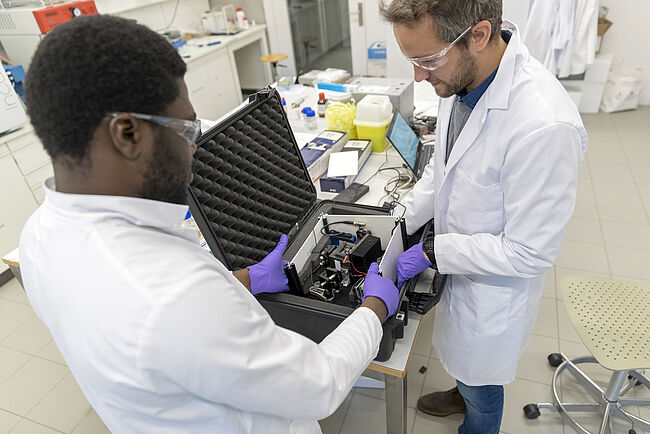
Proof of Concept
30. Maggio 2018
“Without the financial support provided by Bridge, my discovery might have been relegated to the cemetery of good ideas that never materialized,” says Olga Dubey, a biologist and a newly minted entrepreneur.
Such a loss would have been unfortunate for society and the environment as well as for the economy: during her PhD studies, Dubey discovered a natural compound effective against fungal plant pathogens that damage many fruits and vegetables. Launched in December 2016 by the Swiss National Science Foundation (SNSF) and Innosuisse (the Swiss Innovation Agency), the Bridge funding programme is already supporting some 40 projects.
“Our discovery both avoids having to use chemical products that are hazardous to health and reduces agricultural losses,” says Dubey, who did her PhD at the University of Lausanne and continued her research at Agroscope in Changins (VD). “I quickly realised the potential of the new compound. But it still required a number of steps for it to be commercially feasible.” In September 2017 Dubey received a Bridge Proof of Concept grant, a funding scheme specifically targeted at young researchers. It enabled her to refine her product: “We have just applied for a patent and launched our start-up Agrosustain. Starting next year, we plan to offer our compounds to big Swiss agro-food companies.”
Dubey’s success is no surprise to Chris Boesch, a member of the Bridge Steering Committee and a medical imaging specialist at the University of Bern: “Switzerland is bursting with good ideas and discoveries. The number of patents filed here is among the highest in the world. But that doesn’t translate into enough actual innovations. Which is why the new programme was created: so that good ideas don’t go missing.”
Until recently, researchers hoping to develop practical applications for their discoveries were unable to turn to the Swiss National Science Foundation (SNSF), because its core mission is to support research. By the same token, many projects were not yet sufficiently mature to benefit from the support of Innosuisse (formerly CTI). It’s precisely this gap that Bridge fills, by supporting the intermediate phase between research and innovation.
Fast and affordable malaria diagnostics
Launched one year ago, the programme has been a resounding success with researchers. “We have received many more applications than we anticipated,” says Martin Müller, Chair of the Bridge Proof of Concept evaluation panel and a former industry executive. “The selection was very difficult, because the projects submitted were very high quality.”
Jonas Pollard, a chemist at the Adolphe Merkle Institute at the University of Fribourg, received support from Bridge Proof of Concept. He, too, considers the support crucial for his project – developing a rapid diagnostic test for malaria. “Without Bridge support, I wouldn’t have been able to develop this technology.” In the course of his PhD studies Pollard discovered that a biomarker present throughout the life cycle of malaria serves as a catalyst in certain polymerisation reactions, which amplify it and make it visible to the naked eye. That got him thinking about a new diagnostic tool for malaria.
The potential of the discovery is enormous, given that the disease affects more than 200 million people around the world each year and that current diagnostic methods are inaccurate or expensive. Pollard has already produced an initial prototype of a diagnostic tool together with a team of engineers. He also went to Brazil not only to test the prototype but also to get a better grasp of the realities on the ground and to establish contacts with specialist clinics. The next step consists of finding investors interested in funding the technology.
Martin Müller is confident: “Based on the quality of the selected projects, several start-ups are bound to emerge thanks to Bridge support.” Nevertheless, he stresses that risk is an inevitable part of the transition from research to innovation: some projects may come to nought. “But in the end, the researchers won’t have failed because they will have gained so many skills in the process. If it doesn’t work out this time, they will succeed elsewhere! That’s another purpose Bridge serves: fostering an entrepreneurial culture among researchers.”
Ein Programm, das Brücken baut
Das Programm BRIDGE wurde im Dezember 2016 gemeinsam vom Schweizerischen Nationalfonds (SNF) und von der Schweizerischen Agentur für Innovationsförderung (Innosuisse) geschaffen. Es positioniert sich an der Schnittstelle zwischen Grundlagenforschung und angewandter Forschung, indem es die Anwendung wissenschaftlicher Entdeckungen zum Nutzen der Gesellschaft und der Wirtschaft fördert. Das vom Bund finanzierte Programm verfügt für den Zeitraum 2017-2020 über ein Budget von 70 Millionen Franken. Es beinhaltet zwei Komponenten: «Proof of Concept» für junge Forschende ab Stufe Bachelor und «Discovery» für erfahrene Wissenschaftlerinnen und Wissenschaftler. Derzeit werden rund 40 Projekte unterstützt.

